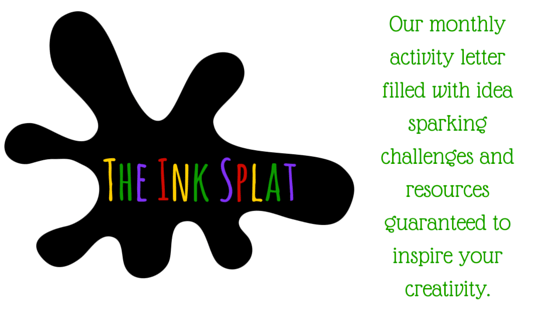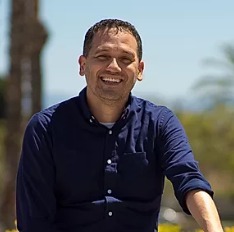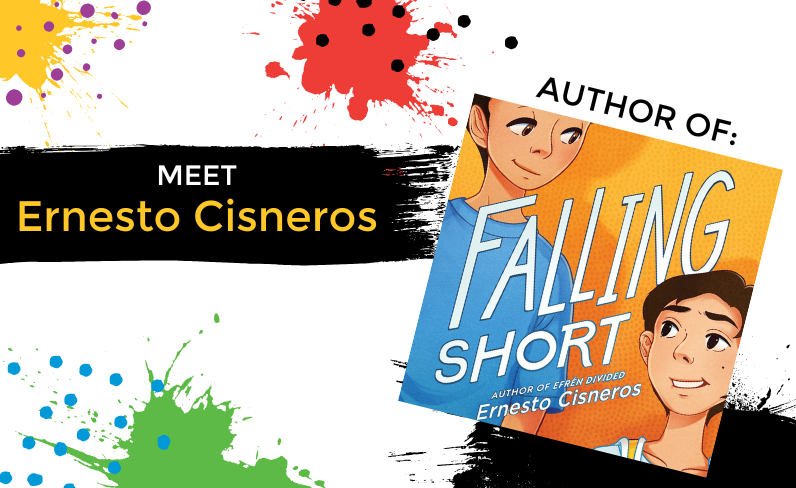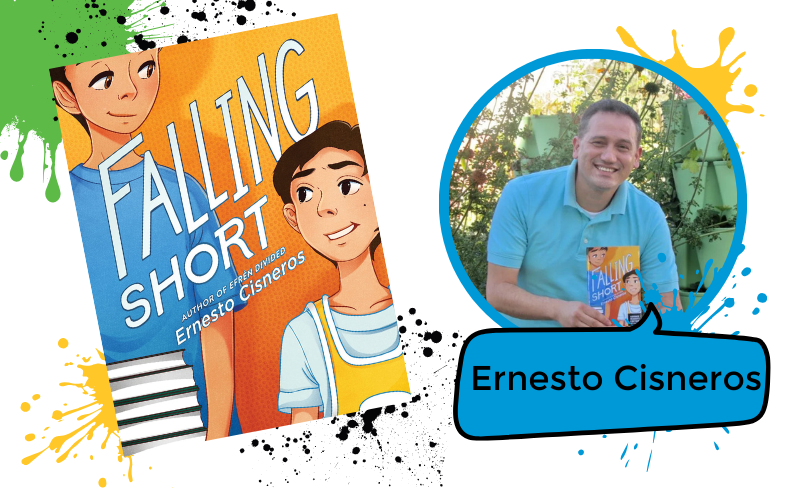Hello Inklings!
This month’s Ink Splat Author Interview features Ernesto Cisneros, Pura Belpré Award-winning author of Efrén Divided and Falling Short. Ernesto shares about the writing journey, writing humor, how to weave personal experiences into our stories, and so much wisdom about the writerly journey. His writing challenge invites us to experiment with character development using our own perspective and experiences.
Learn more about Ernesto at www.ernestocisneros.com.

Writing Challenge: Create a Relatable Character
Think back to your childhood and all the amazing kids you’ve met. Ask yourself, why did you feel a connection to them? What were their actions that drew you to them?
Identify 3-5 specific quirks and personality traits from those children you connected with. Write these down.
Now think about kids you didn’t connect with – perhaps those who were mean or did something you didn’t like, maybe you saw them push another kid. What characteristics made you think, “I don’t want to be friends with that kid”?
PROMPT:
- Use the quirks and personality traits from kids you connected with to create a protagonist.
- Create an antagonist or challenging character by applying characteristics from the kids you didn’t connect with.
- Write a scene where these two characters interact, showing their personalities through their actions.
Remember, one way to know that your characters are relatable is to use qualities that make real people relatable. Use your own experience, create characters who you would want to be friends with, and your readers will cheer those characters on, too.
Where did the idea for Falling Short come from?
The title Falling Short came partly from my fear that my second book would fall short of everyone’s expectations after the success of Efrén Divided. The imposter syndrome hit me hard. How do you follow up something that’s won awards and been nationally acclaimed? The pressure was really on.
With Falling Short, I finally merged my author life and my teacher life, which I had previously kept separate. I was able to embrace the teacher side of me, looking around my classroom, listening to conversations, and taking everything in. I have a little sign on my desk and at the door that says, “Be careful what you say or do, or you could end up in one of my books.”
Many funny moments in the book were actually things kids really did in my classroom. The boy in the nurse’s office who stapled his finger? That happens almost every year at my school. I recently had a student I had to chase around the room because he was too scared to let me remove a staple from his finger. Little things like that had to go into a book, somehow, and I decided to use them in Falling Short.
After Efrén Divided made many readers cry, I felt like I owed them a laugh. I wanted something more lighthearted, especially since my headspace wasn’t in the best place during the pandemic. We were glued to screens all day—working, writing, and even interacting with loved ones—all through computer screens. I found myself not wanting to be on the computer. Every time I touched the keyboard, all that anxiety and those negative feelings came back.
So I focused on humor to make myself feel better. Thinking about all the mischief and things students do would make me laugh. That’s what I wanted—I wanted to laugh, and I wanted kids to laugh too.
But initially, the story actually started with my son. We had some fish at home, and at the store where we bought them, they separated them by “community fish,” “semi-aggressive,” and “aggressive.” When my son went to school his first year, he came back with a notebook where he had classified all his classmates the same way—community kids, semi-aggressive, and aggressive! I thought that was such a wonderful insight, and such a telling detail about my who my son is, and how he sees the world. I decided to give that way of categorizing people to a character, Marco. And from there, the first character for Falling Short, was born.
It’s true, Falling Short is very funny. How do you approach humor as you’re writing? Does it pop up by surprise, or do you use any strategies to amplify the humor in a scene?
When I’m writing a book, I think of it like a roller coaster. If a roller coaster has too many turns, after a while, you get bored. You need the downtime to enjoy the loops. With my stories, I think, “I had a funny scene before, so I need something more dramatic.” I’ll try to add something where maybe something bad happens to a character. Or if I’ve written a dramatic scene, I’ll try to add humor. It’s like having multiple foods on your plate so you can taste different flavors.
How do you define voice? How might a writer work on developing their voice further?
When I first started writing, editors specifically mentioned not being drawn in by my voice. My agent submitted to everybody until we literally ran out of people to submit to. So, I felt like I had to change my voice. I would go to bookstores, find Matt de la Peña’s books and try to mimic his style, then read books by others, like Meg Medina, and add a little of her voice to the mix. My books became a Frankenstein montage—a little bit of this person’s style, a little bit of that person—and that’s what was hindering me.
With Efrén Divided, I went back to my original voice, the way I liked writing, because I wasn’t planning on publishing the book. I just let myself write because I thought nobody was going to see it beyond the students in my classroom. What I learned as I wrote it was that voice is actually a reflection of your personality.
It’s like if I asked everyone to draw a bunny rabbit. Someone might sketch two balls with ears, someone else might draw a realistic bunny, another might just draw the head. Everyone’s rabbit would look different, and that’s the beautiful part. When you write, in your words, the way you put them on the page, I see a glimpse of your personality.
Voice is letting your personality come through. If you’re quirky, let your work be quirky. Whatever you’re into, put it in the book. Let your own style shine through, and don’t worry about how people will view it. That’s what makes your book different from everyone else’s.
I truly believe that just about every book idea has been taken, but we all have our own takes on things, and no people’s perspective looks the same. Your unique voice is what makes your story stand out.
How do you navigate receiving feedback, especially on writing that’s close to your heart?
There’s no secret to handling feedback on personal writing. Unfortunately, it does take tough skin. And like with skin, if you wash dishes long enough, eventually your hands are just going to toughen up. Or if you do enough gardening, your hands are going to become calloused and gardening tasks don’t hurt as much. When my editor says a scene needs to go, I don’t feel hurt anymore. I think, “Is this going to make my story better?” If it will, I’ll try it. I might not always agree with my editor, and sometimes I’m stubborn, but she’s been right every single time.
It’s not unusual to feel hurt in response to feedback, especially at first. Just remember to ask, “Will this make my story better?” If it might, try the suggestion out. Keep your original, and give it a try. And remember that ultimately, your story is your own. You make the final decision.
For me, it also helps to know that every professional receives feedback—I’m not the only one. Knowing other authors experience the same struggles keeps me going.
One more thing: having a support team is crucial. You need to have somebody to talk things through with. I don’t think any writer can write a book alone. It takes a whole community. Without that support, writing is a lonely journey.
Do you have any final words of advice for our Inklings?
I’ve been privileged to win many accolades and awards, but here’s a secret: I am not a very good writer. However, I will work harder than anybody else when it comes to edits, and I can make up ground that way. Sometimes it’s just about the hard work you’re willing to put in.
It may take me more drafts to get to the same point that other people do, but I will get there because I have the ambition and drive. My writing starts out really rough, but anything you write can be improved, especially if you surround yourself with the right people. I probably write more drafts than anybody else, and that’s okay. At the end of the day, nobody knows how many drafts you’ve done—they just see the final product.
Don’t compare yourself to final products. If you pick up one of my books, that’s not just me. That’s me working with two editors plus all the copy editors, friends who read it, and students who provided feedback. That was a huge team of people who came together to help publish that book. If you pick up a book off the shelf, you cannot compare yourself to that person—that’s apples and oranges. We don’t create books alone.

A special thank you to Ernesto Cisneros for sharing with us!
Ernesto Cisneros is the nationally acclaimed author of EFRÉN DIVIDED. He was born and raised in Santa Ana, California, where he still teaches. As an author, he believes in providing today’s youth with an honest depiction of characters with whom they can identify.
EFRÉN DIVIDED is the winner of the prestigious Pura Belpré Medal (2020), the Poppy Award in MG (2021), 2 International Latino Book Awards, as well as an SCBWI Crystal Kite Award (2021).
FALLING SHORT is his sophomore book. It has garnered three starred reviews and the recipient of two International Latino Book Awards, and numerous “Best of 2022” Lists.
Check out Ernesto’s book and all of our recent Ink Splat authors’ works at our Bookshop.org Store.

INKLINGS CONNECT
Fall Creative Writing
Join us for a Writers Circle, 1:1 Mentorship, or Publishing Program this fall. We can't wait to see what you create!
Keep your creativity flowing with our upcoming community events:

SUBSCRIBE
Subscribe to stay in touch with Society of Young Inklings. You’ll receive our monthly Ink Splat newsletter and be the first to know about upcoming events and ways to connect with Young Inklings.




